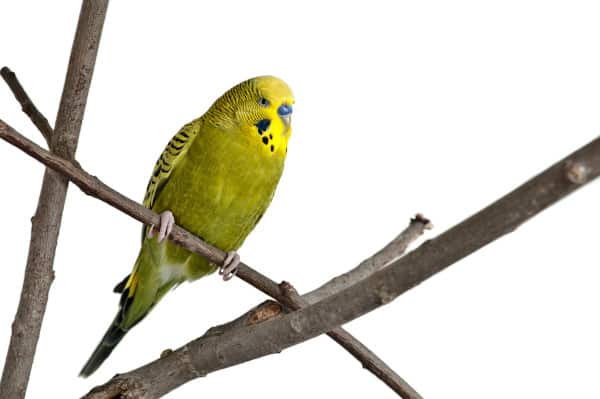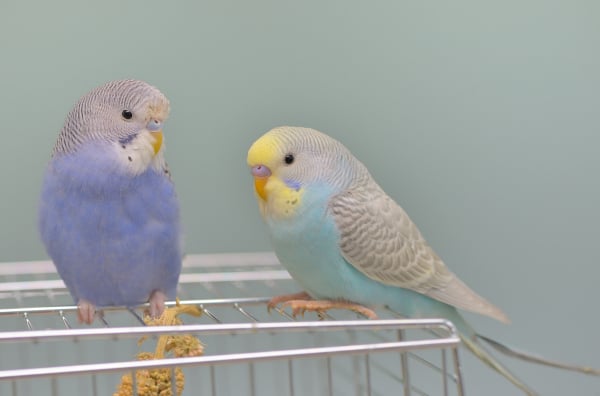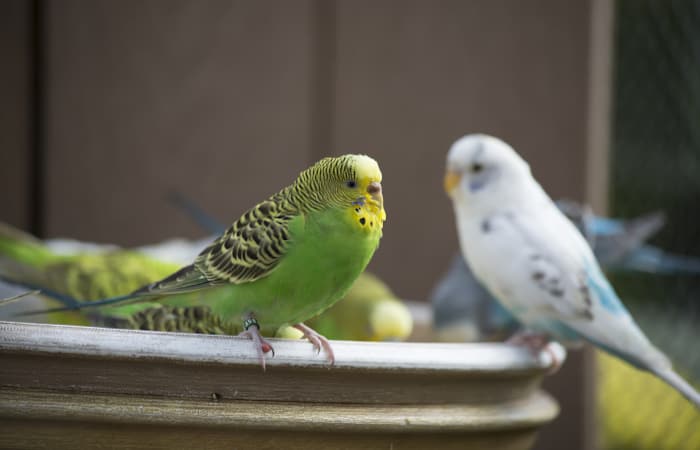Parakeets are small, social birds that make wonderful pets; however, it is important for owners to understand a parakeet’s pooping habits in order to ensure its health and well-being.
Knowing when your parakeet is pooping too often or not enough can alert you to problems such as illness or malnutrition.
In this blog post, we’ll cover why it’s important to know how often do parakeets poop and the factors that affect their pooping schedule.
What are the factors affecting how often parakeets poop?
The frequency of a parakeet’s pooping schedule can depend on a few different factors, such as:
• Diet – A balanced diet is important for any pet, and the type of food they are eating can make a difference in their pooping habits.
• Age – Older parakeets may poop less due to slower digestion; younger birds might poop more often due to their smaller digestive systems.
• Size – Smaller parakeets may poop more often than larger ones.
• Temperature – Parakeets will generally poop more often in warmer climates.
How often do parakeets poop?
As a general rule of thumb, an adult parakeet should be pooping 6-12 times per hour on a balanced diet.
Factors such as age, size, and temperature can affect this number. For example, if your parakeet is younger or smaller, it may poop more often than the average adult.
Additionally, parakeets living in extremely warm climates might need to poop more often due to their body temperature increasing.
It’s important to keep an eye on your parakeet’s pooping schedule to ensure that it is healthy and on track with what is normal for them.
You may also like: Why Do Parrots Eat Their Poop?
How much do parakeets poop?
In general, a healthy parakeet usually poops every 5 to 10 minutes, depending on their size, diet, and overall health.
For example, larger birds tend to produce more excrement than smaller birds.
A healthy parakeet’s facet is green or olive green in color and is a bit watery.
If the poops are too watery or unusually large or small in size, this could indicate that something is wrong and you should seek medical advice from a vet.
How do you know when a parakeet wants to poop?

It can be difficult to tell when a parakeet wants to poop, but there are some signs you can look out for.
A parakeet may start to vocalize more than usual or begin to move around its cage a lot right before it poops; this is a sign that it’s ready to go.
Additionally, your bird may also show physical signs like squatting or fluffing its feathers up as an indication that it needs to poop.
If you suspect your bird is constipated and having trouble pooping, make sure to consult your vet for the best course of action.
You may also like: Do Parrots Poop All Over The House?
Can you teach a parakeet where to poop?

Yes, you can teach a parakeet where to poop.
The simplest way to do this is to use a training perch that has been covered in aluminum foil – most parakeets don’t like the feeling of standing on aluminum foil so they’ll avoid it when possible.
You should place this training perch near their food and water bowls and encourage them to use it by praising them each time they go there.
With enough repetition, your parakeet should learn that the perch is the designated spot for pooping.
Can parakeets poop when they are flying?
Parakeets can technically poop while they are in flight, but it’s very rare and usually only happens in extreme circumstances.
Parakeets will typically wait until they have landed before pooping, so if you catch your parakeet in the act of pooping while airborne, it’s probably because something startled them and caused them to take flight unexpectedly!
Signs of illness or malnutrition by watching poop
It’s important to pay attention to any signs of illness or malnutrition if your parakeet isn’t pooping enough, or too much.
If the parakeet is not pooping regularly, or its bowel movements are watery or appear abnormal in color or size, it could be a sign that something is wrong and you should contact a veterinarian.
In addition to irregularity in the frequency of bowel movements, there are certain symptoms that may be indicative of illness or malnutrition in parakeets.
As their primary source of nutrition comes from seeds, they may become malnourished if their diet does not contain enough nutrient-rich ingredients.
Signs that your parakeet may be receiving insufficient nutrition include weight loss, duller feathers than usual, unkempt plumage, and apathy.
On the other hand, illnesses like avian diseases can also cause problems with a parakeet’s bowels.
Common signs that the bird may be ill include changes in behavior such as reduced activity levels and avoidance of contact; difficulty breathing; sneezing; diarrhea; excessive sleeping; eye discharge; coughing; runny nose and tail bobbing.
It is always best to address any potential issues early on as this can help prevent them from becoming more serious problems in the future.
Keeping an eye out for these warning signs can help ensure that your parakeet remains healthy and comfortable throughout its life.
You may also like: How To Clean A Budgie Cage?
Do parakeets poop in your living room when you let them out of the cage?
Many parakeets may occasionally poop in your living room when you let them out of their cage, but this behavior isn’t typical.
It’s important to clean up any messes left behind by your pet parakeet quickly and efficiently.
To do this, be sure to use a warm damp cloth or a vacuum cleaner for carpets with a pet-safe attachment, disinfectant is also recommended.
Avoid using strong chemicals or ammonia-based cleansers as these can be toxic to birds and make sure that all items are thoroughly dried after cleaning.
Keeping cages neat and tidy is another great way to reduce the number of potential messes in the future.
Additionally, providing your parakeet with plenty of toys and activity centers will help keep them occupied while they’re out of their cages, which can lead to fewer messy accidents.
Conclusion
Understanding a parakeet’s pooping habits is an important part of ensuring its health and well-being.
By understanding how often they should be pooping, what signs of illness or malnutrition to look out for, and how environmental factors can impact their pooping schedule, you can ensure that your parakeet remains healthy.
Paying close attention to the frequency and consistency of your parakeet’s bowel movements can give you an early indication if something is wrong, allowing you to take the necessary steps before it becomes a more serious problem.
